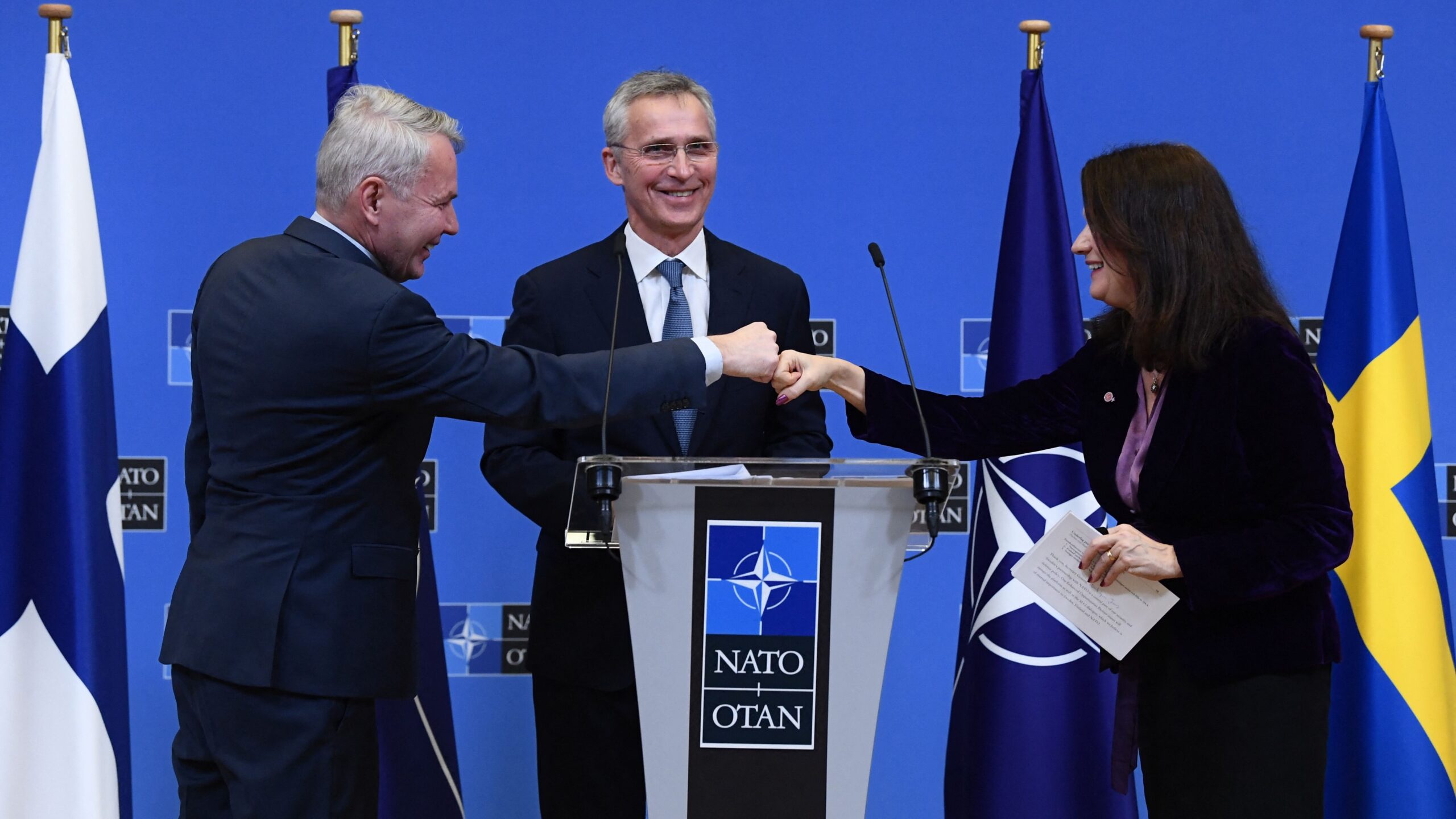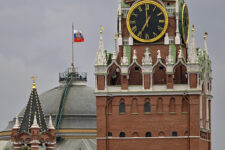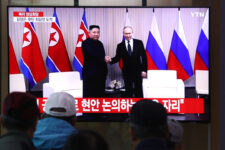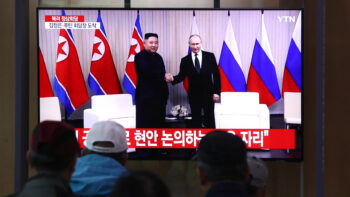
NATO Secretary General Jens Stoltenberg (C) looks on as Finland Ministers for Foreign Affairs Pekka Haavisto (L) and Sweden Foreign minister Ann Linde (R) bump fists after holding a joint press conference after their meeting at the Nato headquarters in Brussels on January 24, 2022. (Photo by JOHN THYS / AFP) (Photo by JOHN THYS/AFP via Getty Images)
WASHINGTON: For years, anytime a defense official from Sweden or Finland traveled to the US, they would be asked whether the two non-aligned nations would consider joining NATO. And while never ruling it out, officials largely have fallen back on the line that it doesn’t seem likely to happen anytime soon.
But with Russia’s invasion of Ukraine, and the clear signals from Washington that the US will only act militarily to protect NATO members in Europe, leaders in both Helsinki and Stockholm will be keeping a close eye on their options, experts say.
“I do think this will reignite a debate in their publics about NATO membership,” said Lauren Speranza of the Center for European Policy Analysis. “Witnessing the war in Ukraine, and seeing where Putin could potentially target next, could create a wider situation where Finland and Sweden’s security may indeed demand closer ties to the Alliance.”
The two Nordic neighbors both rode out the Cold War by not militarily joining either the Western alliance nor the Warsaw Pact. However, both countries are members of the European Union and have roles as observer nations at NATO through the Partnership for Peace system that allows cooperation with the alliance without actually joining.
For all of Breaking Defense’s coverage of the Ukraine situation, click here.
There is no requirement that Finland and Sweden would join NATO together, but it seems unlikely that one would jump without the other, given their close ties and decades of joint military neutrality.
While internal polling in both nations has shown varying levels of support for NATO membership over the years, there has never been enough support to join the alliance. A 2021 poll found that roughly 26% of Finns were in favor of joining NATO, 40% are against, and the remaining population was undecided. In Sweden, a 2022 poll found 42% in favor and 37% against — a stronger starting point, but still not enough to cause politicians to begin a serious ascension effort.
That ambivalence, however, may change in light of Russia’s actions. On Thursday, Finnish Prime Minister Sanna Marin stated as a press conference that “Finland is not currently facing an immediate military threat, but it is also now clear that the debate on NATO membership in Finland will change.”
Asked about those comments at a Friday press conference, Russian foreign ministry spokeswoman Maria Zakharova responded with a not-so-veiled threat.
“Obviously, the accession of Finland and Sweden to NATO, which is primarily a military alliance as you well understand, would have serious military and political consequences, which would require our country to make response steps,” Zakharova said in comments translated by the EuroAsian Times.
“We regard the Finnish government’s commitment to a military non-alignment policy as an important factor in ensuring security and stability in northern Europe,” Zakharova said in remarks tweeted out by an official Russian government account, which again repeated the “military and political repercussion” line.
Finnish PM Marin wants stronget EU sanctions on Russia, including SWIFT.
On Zakharova's threats: Finland makes it's own decision based on national interests.
— Aki Heikkinen (@akihheikkinen) February 25, 2022
Alexander Stubb, who served from 2008-2016 as Finland foreign minister, later tweeted that “Russia is pushing Finland closer to NATO membership. [Closer] than ever before. Our security has been partially based on an option to join. At this rate we have no other option but to join. Finland’s accession would strengthen the Alliance and help keep Northern Europe stable.”
So what happens now?
“I don’t think the people of Sweden and Finland will be intimidated by Putin to forsake NATO membership,” said Jorge Benitez of the Atlantic Council. “I think Putin’s aggressive behavior and bullying threats will soon push Sweden and Finland to join the Alliance. Russia will try hard to impede their membership, but Sweden and Finland are robust democracies and will eventually join the other democracies in NATO.”
In fact, Benitez predicted, “I am confident that before 2022 is over, Sweden and Finland will request membership in NATO.”
For her part, Speranza said she believed that in the short term, “we will not see any immediate moves for Finland or Sweden to join NATO.
“In a time of crisis like this, their governments will opt for stability and predictability, wanting to avoid any sudden decisions that could have escalatory or unintended consequences,” she said. But like Benitez, she sees the potential for public support to shift thanks to the Ukraine situation.
Rachel Rizzo, also of the Atlantic Council, is less confident that membership is in the offing, although she predicts that Sweden and Finland will continue to have close ties to the alliance.
“I don’t think there’s an appetite, at this point, for Finland and Sweden to change their position on NATO membership,” she said. “I think they’ll continue cooperating closely with the alliance, and clearly and publicly link their own security with broader Euro-Atlantic security. But as far as a push for official NATO membership now, I don’t see it happening.”
However, she added a prediction of her own: “If Finland or Sweden saw an actual threat from Russia, I’d be surprised if NATO didn’t get involved even though [the two nations] wouldn’t be protected under Article 5. That’s how close the relationship is.”
China stirred the Pacific pot, Japan powered up and Aussie AUKUS anxiety emerged: 2024 in review
The Chinese military itself wasn’t free from drama, as Beijing cycled through defense ministers and senior officials fell under investigation.

























